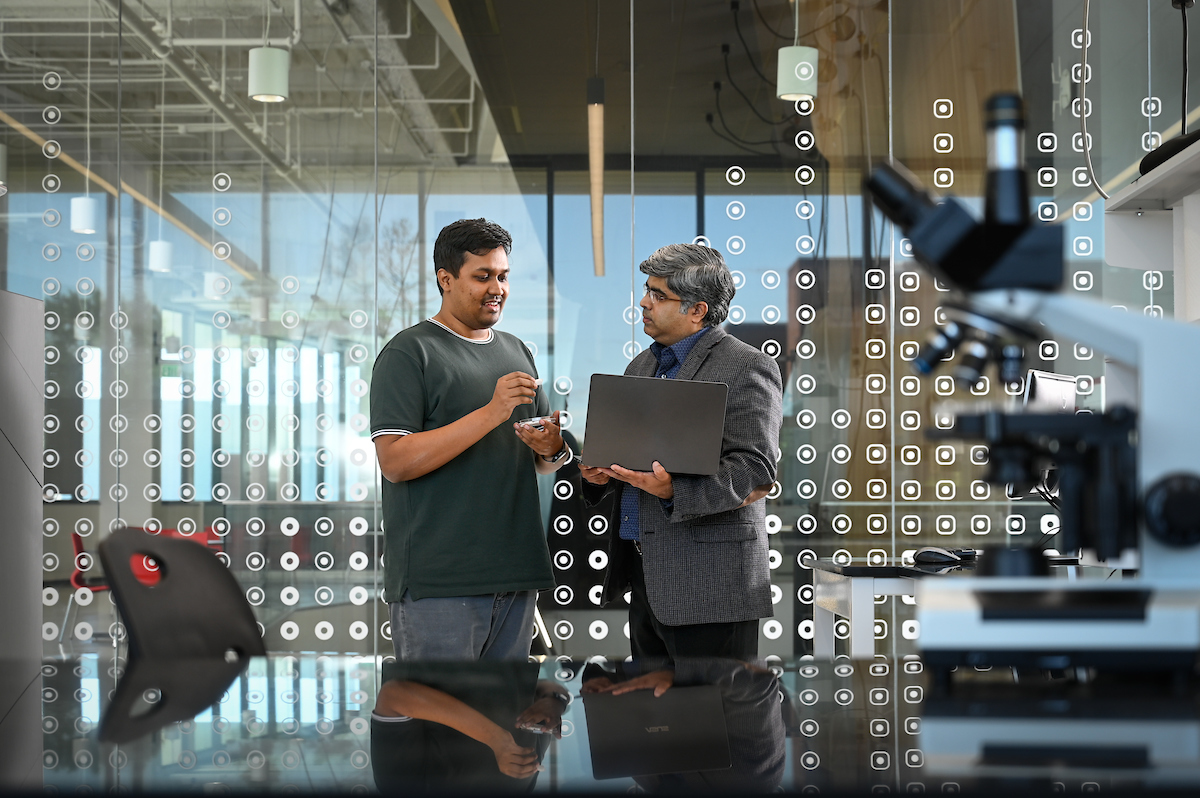
Research
The College of Engineering at NC State is one of the world’s preeminent engineering research institutions.
Leading the Way
Research is central to what we do in the College of Engineering at NC State. Through our work, we aim to find the best solutions to some of the world’s most pressing problems. College researchers are developing cleaner energy, faster computers, stronger and lighter materials, and better medical devices, among many other initiatives.
Behind all this significant work are the people. Our faculty members are world leaders in research and innovation. They have won 25 NSF CAREER Awards since 2015. Twenty-one are members of the National Academy of Engineering. Three are in the National Inventors Hall of Fame and eleven are National Academy of Inventors Fellows.

The breadth of our programs allows exceptional opportunities for interdisciplinary collaboration, both within and outside the college. A number of our faculty members are part of the university-wide Chancellor’s Faculty Excellence Program, in which they work in interdisciplinary clusters to study areas such as carbon electronics and personalized medicine.
Funders have flocked to our work, providing millions of dollars in funding to keep these research results coming. Programs like the $1.5 million Game-Changing Research Incentive Program ensure researchers have the freedom they need to pursue their important work.
Research with Real Results
We know how to work with industry-leading partners — many of whom are our neighbors on Centennial Campus — to find and execute solutions.
One example of this partnership prowess is PowerAmerica, which is developing advanced manufacturing processes that will enable large-scale production of wide bandgap semiconductors. This technology has the potential to reshape the American energy economy by increasing efficiency in everything that uses a semiconductor, from industrial motors and household appliances to military satellites. In 2014, President Barack Obama tapped NC State to lead this center, working with four other universities and 18 energy industry leaders.
The College of Engineering is one of only two in the nation to concurrently lead two NSF Engineering Research Centers. The ASSIST Center is developing wireless health monitoring devices, while the FREEDM Systems Center is creating an “energy internet” that will transform the way electric power is distributed and stored.
The college also leads 12 NC State research centers and institutes, including the Bezos Center for Sustainable Protein, the AI Institute for Engaged Learning, the Nuclear Reactor Program and the Secure Computing Institute. And the more than 40 startup companies that have come out of the college since 2006 prove that our researchers are producing solutions that improve the lives of people around the world.

Research at FREEDM
At the FREEDM Systems Center, world-class scholars, industry-leading companies and high-performing students are working to modernize the electric grid and mold the generation of leaders who will make sustainable energy a fully integrated part of America’s energy mix.
Great Spaces for Great Ideas
Much of the College’s work takes place on Centennial Campus, a 1,334-acre melting pot of education, research, industry, government and community spaces. The campus is home to more than 70 government, industry and nonprofit partners along with more than 70 NC State research and academic units.
The state-of-the-art engineering buildings on Centennial Campus and their proximity to industry and government facilities foster innovation in research and education. They also inspire and enable faculty members and students to collaborate to address the grand challenges of 21st century society.
Two North Carolina State University industrial engineering alumni supported the College of Engineering’s newest building with the largest gift given for a campus building naming in NC State’s history.

Fitts-Woolard Hall
Fitts-Woolard Hall opened in summer 2020. The College’s newest facility marks a crucial next step in the College of Engineering’s move to Centennial Campus, providing critical infrastructure that allows faculty members and students to leverage the power of convergence across disciplines in an atmosphere unmatched anywhere in the nation.
On April 20, 2018, the University broke ground on Fitts-Woolard Hall, which came about as the result of a $25 million gift from alumni Edward P. Fitts, Jr. and Edgar S. Woolard, Jr. The $154-million project was also funded in part by the passage of the May 2016 Connect NC bond referendum and other private donations to the College of Engineering.
In summer 2020, Fitts-Woolard Hall opened and became NC State’s fourth engineering building on Centennial Campus, continuing the unification of the College and leveraging the power of convergence across disciplines, forming one of the world’s most dynamic research and education environments. Fitts-Woolard Hall houses state-of-the-art classrooms and cutting-edge laboratories that further research in bio-manufacturing, advanced manufacturing, rapid prototyping, health systems engineering, environmental engineering, construction engineering and management, transportation systems and other fields of engineering research. The Department of Civil, Construction, and Environmental Engineering; the Edward P. Fitts Department of Industrial and Systems Engineering; and the dean’s administration are all housed within the building.
Your Research Resource
The Office of Research and Graduate Programs, led by Associate Dean of Research and Infrastructure Chris Frey and Associate Dean of Graduate Programs and Postdoctoral Affairs Kara Peters, oversees the facilities and activities of research and graduate studies in the college. It is responsible for the Office of Research Administration and Engineering Online, as well as for the college’s graduate programs, research labs and centers.
More Information
Nearly $260 million in research spending
The college’s total research expenditures in 2023-24, a key measure of overall research activity, consistently places it among the top schools in the US.


